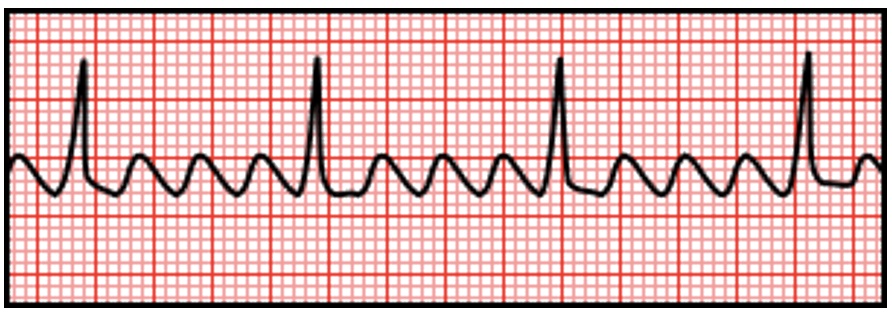Atrial Flutter (A-Flutter)
Atrial Flutter (A-Flutter)
David Ray Velez, MD
A Regular Organized Rhythm Caused by an Atrial Reentrant Circuit
EKG Pattern
- Rapid Regular Atrial Depolarizations (“Saw Tooth” Pattern) – About 300 bpm
- Not All P Waves Produce a Ventricular Contraction
- Regular Ventricular Rate – About 150 bpm

Atrial Flutter
Classification
- Typical (Type I) Atrial Flutter: The Reentry Circuit Involves the Cavo-Tricuspid Isthmus (CVI)
- Anticlockwise Reentry: Produces Inverted Flutter Waves in the Inferior Leads (II, III, and aVF) with Positive Flutter Waves in V1 (Most Common – 90%)
- Clockwise Reentry: Produces Positive Flutter Waves in the Inferior Leads (II, III, and aVF)with Inverted Flutter Waves in V1
- Atypical (Type II) Atrial Flutter: Does Not Involve the Cavo-Tricuspid Isthmus, Includes Any Other Flutter Pattern
Complications
- Impaired Atrial Systolic Function (“Atrial Kick”) – Decreased Ventricular Filling
- Increases Risk for Thromboembolism Formation within the Left Atrium
- Risk for Stroke or Other Ischemic Events (Probably Lower Risk than that in Atrial Fibrillation)
Treatment
- Unstable: Synchronized Cardioversion (Start with 100 J and Increase to 150 J if Fails)
- Stable: Consider Rate Control
- Rate Control is Generally More Difficult than in Atrial Fibrillation
- Indications for Rate Control:
- Symptomatic
- Prevent Symptoms if Likely to Be Recurrent
- Prevent Tachycardia-Mediated Cardiomyopathy
- Preferred Agents:
- Immediate Control: IV Diltiazem or Esmolol
- Long-Term Therapy: Oral Diltiazem or Verapamil
- *See Antiarrhythmic Pharmacology
- Consider Synchronized Cardioversion for Symptomatic Atrial Flutter Episodes – High Success Rates
- Chronic Management is Generally Best Treated by Ablation of the Reentrant Circuit
Anticoagulation Indications
- Persistent > 48 Hours
- If Cardioversion Required
- CHADS-VASC Score ≥ 1-2
- CHF History (+1)
- HTN History (+1)
- Age ≥ 65 (+1) or ≥ 75 (+2)
- DM History (+1)
- Stroke/TIA/Thromboembolism History (+2)
- Vascular Disease History (MI, PAD or Aortic Plaque) (+1)
- Sex Female (+1)
